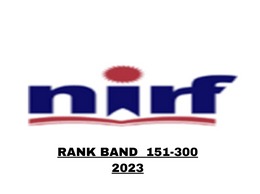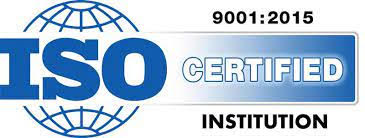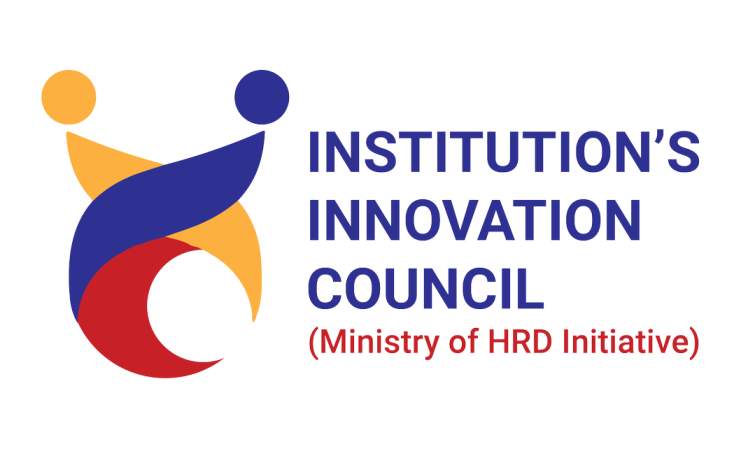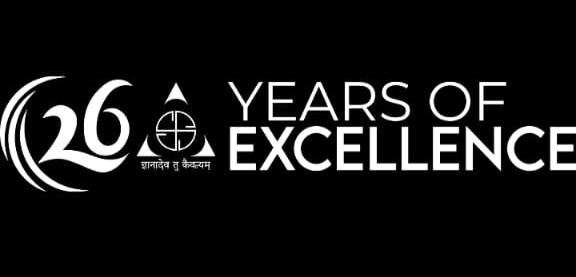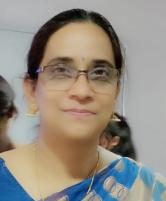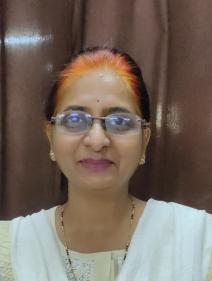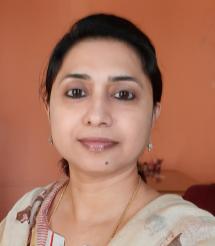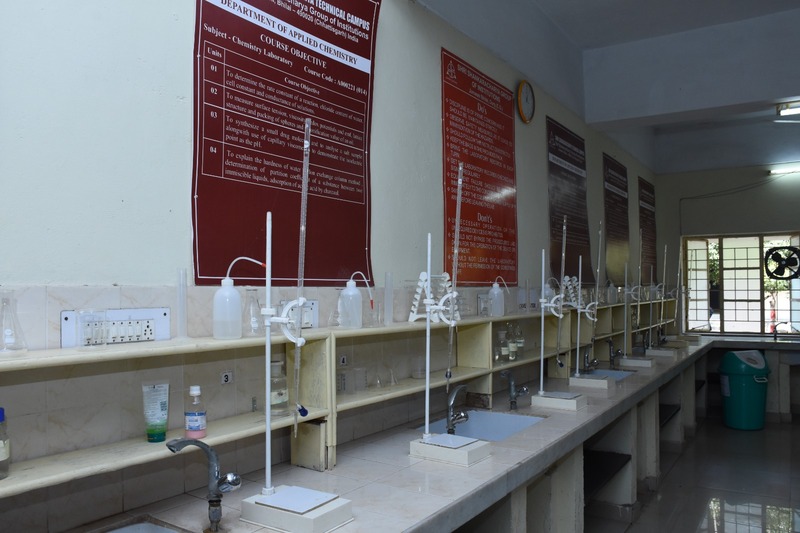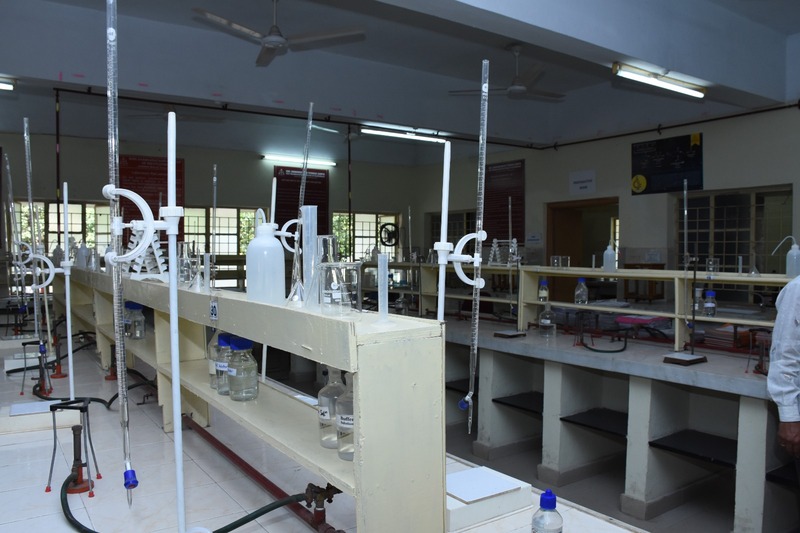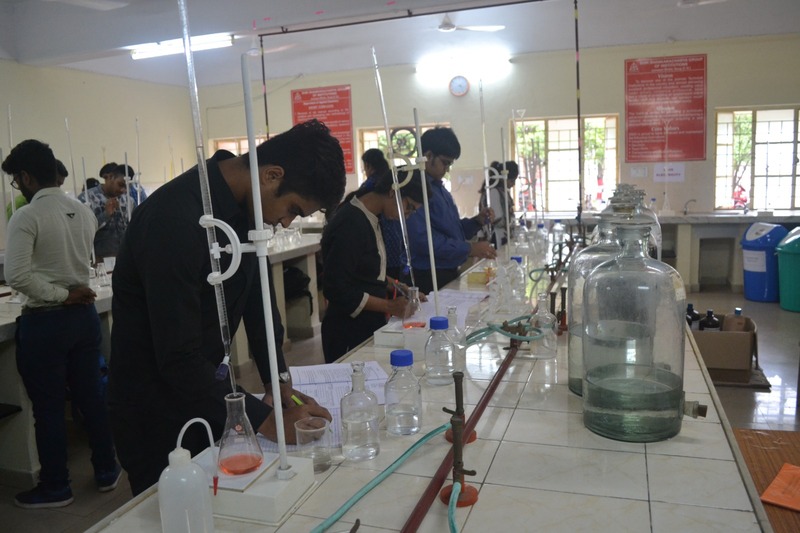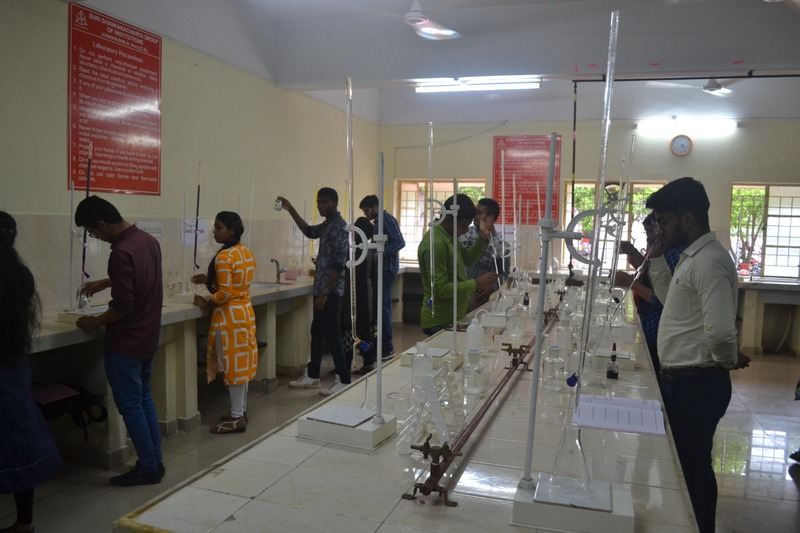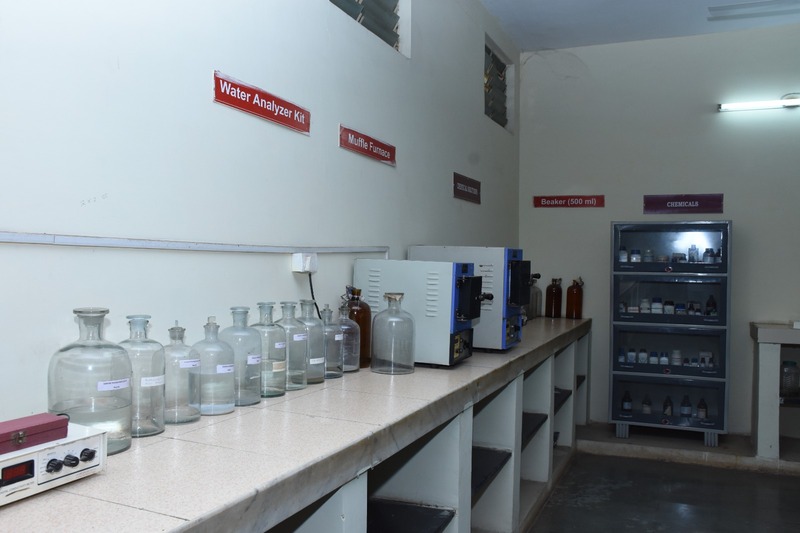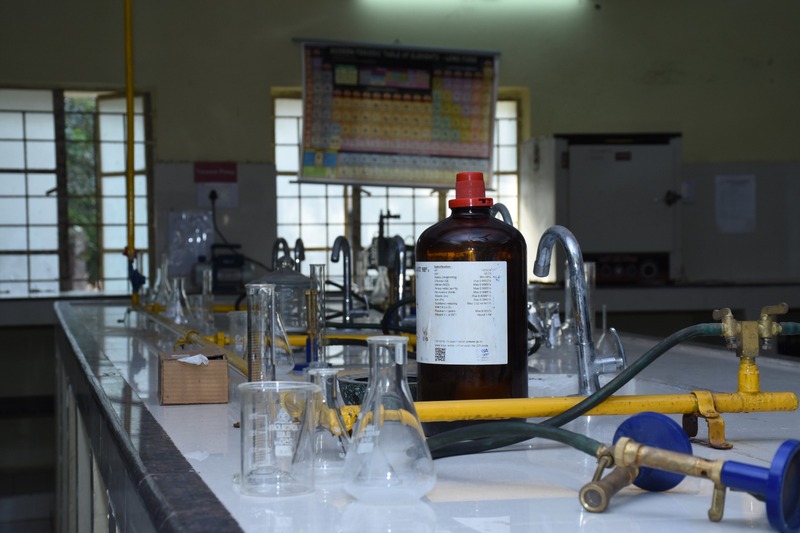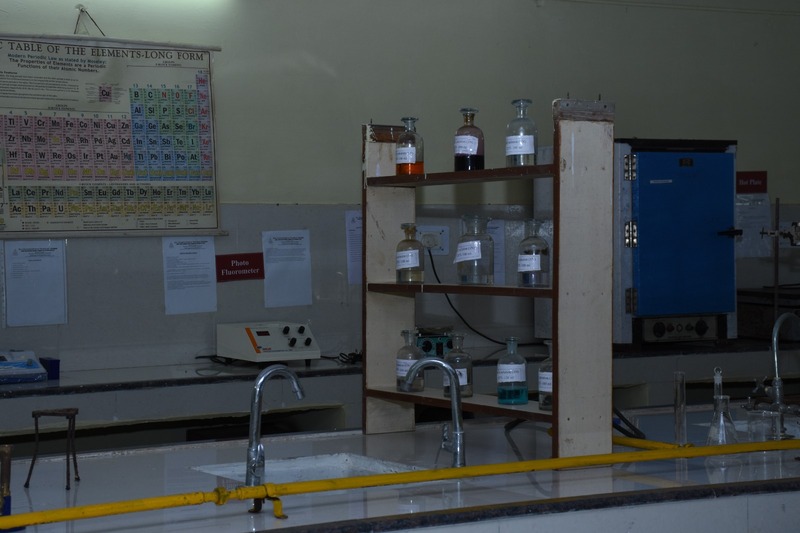About the Department
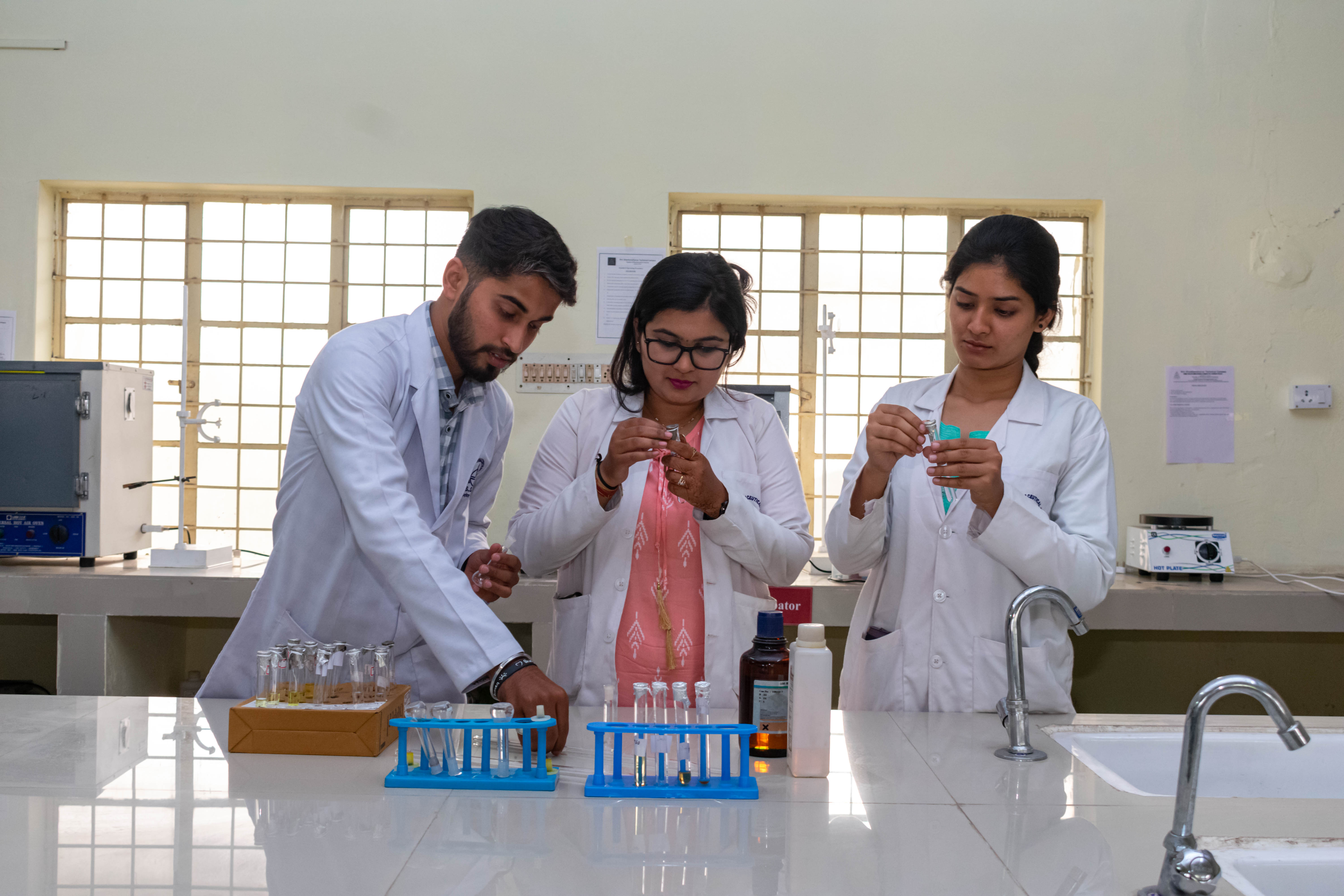
For engineering education, the Department of Applied Chemistry works as a foundation. The Department of Applied Chemistry strives and wishes for increasing the knowledge, and power of analyzing technically each and every individual student. The department is committed to impart quality teaching and acts as catalyst to develop perfect approach to unlock hidden talent of the students to fulfill the needs of young engineers. The department fraternity also plays a pivotal role as mentor and counsels the students towards enriching them to enhance and excel with good academic performance.
Applied Chemistry also provides the scientific field for understanding basic chemical properties of materials and for producing new materials with well-controlled functions. All these helps to solve many future problems, including sustainable energy and food production, managing our environment, providing safe drinking water and promoting human and environmental health.
Vision
To become one of the premier Technical Institute in the country abroad delivering excellent professional education creating value based globally y competitive professional. Applied chemistry department has a vision of promoting an environment where faculty, staff, students can conduct result oriented research and societal needs.
Mission
The institute strives for providing a technically advanced academic environment and achieving a National recognition through acquiring a well this directed honest efforts.
Programme Specific Outcome (PSOs) for U.G. Programme
- Apply principles of Engineering, Electronics and Computer Science, Physics, Chemistry, Environmental Science, Mathematics (including differential equations, discrete mathematics, linear algebra and complex variables) and laboratory skills for building, testing, operation and maintenance of high currents electrical systems, such as, Electrical Machines, Power and Energy Systems.
- Model, analyse, design, and realize physical systems, components or processes related to high current electrical engineering systems.
- Work professionally in Power Systems Engineering, Control Systems Engineering and Software Industries.
Programme Outcome (POs) for U.G. Programme
- Engineering knowledge:Apply the knowledge of Mathematics, Science, Engineering fundamentals, and an engineering specialization to the solution of complex engineering problems.
- Problem analysis: Identify, formulate, review research literature, and analyze complex engineering problems reaching substantiated conclusions using first principles of mathematics, natural sciences, and engineering sciences.
- Design/development of solutions: Design solutions for complex engineering problems and design system components or processes that meet the specified needs with appropriate consideration for the public health and safety, and the cultural, societal, and environmental considerations.
- Conduct investigations of complex problems: Use research-based knowledge and research methods including design of experiments, analysis and interpretation of data, and synthesis of the information to provide valid conclusions.
- Modern tool usage: : Create, select, and apply appropriate techniques, resources, and modern engineering and IT tools including prediction and modeling to complex engineering activities with an understanding of the limitations.
- The engineer and society: Apply reasoning informed by the contextual knowledge to assess societal, health, safety, legal and cultural issues and the consequent responsibilities relevant to the professional engineering practice.
- Environment and sustainability: Understand the impact of the professional engineering solution sin societal and environmental contexts, and demonstrate the knowledge of, and need for sustainable development.
- Ethics: Apply ethical principles and commit to professional ethics and responsibilities and norms of the engineering practice.
- Individual and team work: Function effectively as an individual, and as a member or leader in diverse teams, and in multidisciplinary settings.
- Communication: Communicate effectively on complex engineering activities with the engineering community and with society at large, such as, being able to comprehend and write effective reports and design documentation, make effective presentations, and give and receive clear instructions.
- Project management and finance: Demonstrate knowledge and understanding of the engineering and management principles and apply these to one's own work, as a member and leader in a team, to manage projects and in multidisciplinary environments.
- Life-long learning: Recognize the need for, and have the preparation and ability to engage in independent and life-long learning in the broadest context of technological change.
Publications
- Determination Of Physico-Chemical Parameters And Levels Of Heavy Metals In Food Waste Water With Environmental Effects, S. Biswas & N. V. Ravi Shekhar, Bioinorganic Chemistry And Applications, 2020, 1565-3633(P), ISSN No. 1687-479x (O). Https://Www.Hindawi.Com/Journals/Bca/2020/8886093/
- Adsorptive Extraction Of Uranium(Vi) From Aqueous Phase By Dolomite, Vijita Diwan A,*, Santosh Kumar Sar B, Supriya Biswas A, Rajesh Lalwani, Groundwater For Sustainable Development, 2020, 2352-801x/©. Https://Doi.Org/10.1016/J.Gsd.2020.100424 Received 9 March 2020; Received In Revised/
- Occurrence Of Uranium In Groundwater Of Kabirdham, Central India, V. Diwana,*, S. K. Sarb, S. Biswas, T. Baghelc, And R. Dewangand, Radiochemistry, 2020, Vol. 62, No. 3, Pp. 424–431. Issn No. 1066-3622, Doi: 10.1134/S1066362220030169.
- Analysis Of Experimental Data Of Hydrolysis Of Carboxylate Ester In Non-Ionic Microemulsion System By Kinetic Models, Dr. S. Biswas & D. K. Pandey, Egyptian Journal Chemistry,Accepted,25/09/2020,Manuscript Id : Ejchem-2006-2705/ Issn: 23570245
- Study The Experimental Data Of Hydrolysis Reaction Of Carboxylate Ester With Nucleophile In Cationic Microemulsion Media Using Kineti Models, Dr. S. Biswas & D. K. Pandey, Gedrag & Organisatie Review, 2020, Vol. 33, Issue-02, 2524-2536, Issn : 0921-5077http://Www.Doi.Org/10.37896/Gor33.02/281/
- Analysis Of The Expermintal Data Of Acid Hydrolysis In Micelle Assemblies Using Kinetic Models, Dr. S. Biswas & D. K. Pandey, International Journal Of Chem Tech Research, 2020, Vol. 13, No.-03, 195-202, Issn: 2455-9555(Online), Issn : 0974-4290, Http://Dx.Doi.Org/10.20902/Ijctr.2019.130316/
- Kinetic Study Of Acidic Hydrolysis Of Carboxylate Ester With Nucleophiles In Micellar Media, Dr. S. Biswas & D. K. Pandey, Asian Journal Of Chemistry, 2019, Vol. 31, No.-07, 1595-1598, Issn: 0975-427x (Online)Issn: 0970-7077 (Print), Http://Doi10.14233/Ajchem.2019.22000/
- Kinetic Study Of The Alkaline Hydrolysis Of Carboxylate Ester With Hydroxamic Acid In Micellar Media, Dr. S. Biswas & D. K. Pandey, International Journal Of Management Technology, 2019, Vol.- 9 Issue – 4,Page- 4794-4800, Issn No: 2249-7455,ISSN No:2277-2723, Http://Www.Universalreview.Org/Gallery/93-Mar2019.Pdf/
- Spectrophotometric Determination Of Zinc In Food Waste Water Sample In Presence Of Surfactant Using Dithizone Method, Dr. S. Biswas & N. V. Ravi Shekhar, International Journal Of Social Ecology And Sustainable Development, Ace[Ted 2019, Issn No:1947-8472 E-ISSN No: 19478410, Https://Www.Igi Global.Com/Submission/Manuscripts/?Pids=20%2c4/
- Uranium In Ground Water Of Rajnandgaon District Of Central India, Vijita Diwan1 • Santosh Kumar Sar2 • Supriya Biswas1 • Rakesh, Ournal Of Radioanalytical And Nuclear Chemistry, (2019), 321:293–302, Https://Doi.Org/10.1007/S10967-019-06568-9
- Kinetic Study Of The Carboxylate Ester With Hydroxamate Ion In Cationic And Non-Ionic Microemulsion System, Dr. S. Biswas & D. K. Pandey, International Journal Of Advanced In Management, Technology And Engineering Sciences, 2018, Vol. 8, Issue -01, January 2018, Page-405-411, Http://Ijmte.Org/Vol-8, Issue1-2018,Doi:16.10089.Ijamtes.2018.V8i01.15.2048.
- Study On Assessment Of Heavy Metal Using Surfactant And Its Environmental Effects, Dr. S. Biswas & N. V. Ravi Shekhar, 2018, International Journal Of Advanced In Management,Technology And Engineering,IJMTE, Vol. No:8 Pg-125-132, Http://Ijamtes.Org/Gallery/23.%20may%20%20ijmte%20-%20485.Pdf/
- Determination Of Physicochemical Parameters And Study Of Some Heavy Metals And Its Effects Of Food Waste Water Of Raipur, Dr. S. Biswas & N. V. Ravi Shekhar, Journal Of Emerging Technologies And Innovative Research,2018, Vol.No. 5 Pg-283-289, 2349-5162, Http://Www.Jetir.Org/Papers/Jetir1804275.Pdf
- Study Of Uranium Level In Groundwater Of Balod District Of Chhattisgarh State, India And Assessment Of Health Risk, Santosh Kumar Sar, Vijita Diwana, Supriya, Human And Ecological Risk Assessment: An, 2018, Vol. 24, No. 3, 691–698, Issn: 1080-7039 (Print) 1549-7860 (Online), Homepage: Http://Www.Tandfonline.Com/Loi/Bher20
- Effect Of Surfactant Agglomerate In Water Quality Assessment, Dr. S. Biswas & Pratibha Kurup, Research Journal Of Life Sciences, Bioinformatics, Pharmaceutical And Chemical Sciences, 2017, Rjlbpcs 4(2) Page No.302, -Issn : 2454-6348, Http://Rjlbpcs.Com/Doi://Doi.Org/10.26479/
- Comparative Study Of Metal Analysis In Fresh Water Samples Using Surfactant Assemblies, Dr. S. Biswas & Pratibha Kurup, Journal Of Emerging Technologies And Innovative Research, Jetir (Online), 2017, Volume 4, Issue 11, November 2017, Pg No.810-816. (Issn-2349-5162), Http://Doi.One/10.1717/Jetir.17105/
- Surfactant Assemblies And Their Application In The Determination Of Water Quality Of Bore Well Water In Durg District, Chhatisgarh, Dr. S. Biswas & Pratibha Kurup, Advance Physics Letter, 2016, Vol_3, Issue_2, 2016.Page No 9-14, Issn (Print) : 2349-1094, Issn (Online) : 2349-1108, Http://Www.Irdindia.In/
- Assessment Of Physicochemical Quality Of Food Waste Water Of Raipur Area, Dr. S. Biswas & N. V. Ravi Shekhar, International Journal Of Engineering Research- Online,2015, Vol No. 3 Pg No: 259-264, 2321-7758, Http://Www.Ijoer.In/3.1.15/N.V.Ravi%20shekhar%20259-264.Pdf/
- Analysis Of Food Waste Water From Raipur Area By Atomic Absorption Spectrophotometer, Dr. S. Biswas & N. V. Ravi Shekhar, 2015, International Journal Of Physical And Applied Sciences, Vol No: 02 Pg- 25-33, Issn No. 2394-5710, Http://Ijmr.Net.In/Pastijpas.Php?P=Volume%202,Issue%203,March2015/
- Heavy Metals Removal From Food Waste Water Of Raipur Area Using Bioadsorbents, Dr. S. Biswas & N. V. Ravi Shekhar, International Journal Of Advanced Research In Engineering & Applied Sciences, , 2015, Vol No:4 Pg- 72-78, 2278-6252, Http://Www.Garph.Co.Uk/Ijareas/Feb2015/6.Pdf/
- Analysis Of Shivnath River Water Using Surfactant Assemblies, Dr. S. Biswas & Pratibha Kurup, International Journal Of Chemical And Pharmaceutical Analysis, Vol.2, No.4, 2015. Eissn: 2348-0726; Pissn : 2395-2466, [Doi : Http:/Doi.Org/10.21276/Ijcpa]/.
- Bimal Verma & Lakshmikanta, “Synthesis and Characterization of Dye Based Colored Co-polyesters”; Journal of Indian Chemical Society, Vol. 82, pp. 718-722, Aug.-2005
- Lakshmikanta & Bimal Verma, “Viscometric Studies and Thermal Characterization of Interfacial Polymers Having Aliphatic Lactone Ring Synthesized from Succinic Acid and Various Phenols”, Journal of Indian Chemical Society , Vol 90,No. 12, pp. 2247-2256, Dec. 2013
- Lakshmikanta & Bimal Verma, “Synthesis of Dye Based Colored Polyesters by Interfacial Polymerization”; Journal of Indian Chemical Society , Vol 91, No. 4, pp. 739- 746, April 2014
- . Published paper entitled “Analysis of size fractionated atmospheric particulate in Bhilai in central east India”in Indian journal of environmental protection ISSN-0253-7141, vol-30, number-7, pp 529-540, July 2010.
- Published paper entitled “Spectrophotometric determination of Fe(III) in environmental samples using 2-FHA” EM international Pune, 31, vol-2, pp 255-260, 2012, ISSN 0257-8050.
- Published paper entitled “Study of rain water composition in bhilai central india (chhattisgarh)” Indian journal of environmental protection,ISSN-0253-7141, vol-32,(1), pp-12-19, 2012.
- Published paper entitled “comparative study of some specific contaminants in the air and rain water at bhilai, chhattisgarh” EM international Pune ISSN 0257-8050, 31, vol-3, pp 357-364, 2012.
- Published paper entitled “Status Of Aluminium, Cadmium, Copper, Iron And Zinc In Rain Water Of Bhilai Central India (Chhattisgarh)”, Vasundhara (The Earth), Vol-4,Pp 15-21, Issn-0973-959x.
- Published paper entitled “ Estimation of nickel emission in the urban environment of an industrial city Bhilai, India” Research journal of chemical sciences, by international science community association,ISSN 2231-606X, pp 1-6, 2017.
- Published paper entitled “Status of particulate matter in industrial city Bhilai” IJAMTES, by UGC, ISSN 2249-7455, vol-8, issue-3, pp 1690-1708, 2018.
- Published paper entitled “Non-invasive portable uric acid sensor for biomedical and healthcare application” Materials Today, by ELSEVIER, ISSN 2352-4928,https://doi.org/10.1016/j.matpr.2021.05.626, June 2021.
- Dr.S.Anand Giri and Dr. Nidhi Tiwari, Prospects and challenges in CCS Technology Deployment in India, IJSER, Vol.4, Issue9.(2013)
- Nidhi Tiwari and Rama Pande, Protonation and Salting-in Behaviour of weak organic bases in HClO4.Z.Phys.Chim Vol.94, (2002),1411.
- Nidhi Tiwari and Rama Pande,Phase Transfer properties of Non-electrolytes: Hydroxamic Acids, Journal of Molecular liquids, Volume-94,(2001),261.
- Effect of cationic surfactant on the oxidation of galactose by N-bromophthalimide in the presence of acidic medium: a kinetic and mechanistic study, Tenside Surfact det., Vol. 50, no. 4, 297-303.
- Impact of cationic surfactant on oxidation of D- arabinose by N- bromophthalimide in the presence of acidic medium: a kinetic study, Int. J. of Pharm. Life Sci., Vol. 5, no. 2, 3330-3337.
- Effect of cetylpyridinium chloride (cpc) on D-xylose in the acidic medium: a kinetic oxidative study, Int. J. of Engg. Sci.& Mgmt., Vol. 4, no. 2, 57-63.
- Mathai. R.V., Chhattejee. J.M., Sar. S.K (2022). COVID-19 and medicinal plants: A critical perspective. Forensic Science International: Animals and Environments. https://orcid.org/0000–0002-3420–1412(Elsevier)
- Mathai. R.V., Chhattejee. J.M., Sar. S.K (2021). Phytochemical and Qualitative Characterization of Leaves of Some Noteworthy Medicinal Plants of Chhattisgarh, India. Rasayan Journal of Chemistry. 14(2):1423-1434. http://dx.doi.org/ 10.31788/RJC.2021.1426281. (SCOPUS)
- Mathai. R.V., Chhattejee. J.M., Sar. S.K (2021). Quantitative Analysis of Elements in Efficacious Some Medicinal Plants by Using ICPMS and IRMS Method. Indian Journal of Ecology.48 (4): 1068-1074.(SCOPUS)
- Mathai. R.V., Sar. S.K (2012). Estimation of Acetaminophen in waste water of Bhilai region. International Journal of Advanced Engineering Research and Studies E-ISSN2249–8974.
Conference Publications
- Lakshmikanta & Bimal Verma, “Synthesis and characterization of internally colored polyesters from phenolphthalein and fluroescein type of dye moiety”; Paper presented in 24th Annual conference, Indian Council of Chemists,B.I.T. Mesra, Ranchi, 16-18 Dec. 2005
- Lakshmikanta, “Colored Polyesters derived from phenolphthalein and fluorescein type of dye moieties by interfacial polycondensation”; paper presented in 47th Annual Convention of Chemists & International Conference on Recent Advances in Chemical Sciences,School of Studies in Chemistry, Pt. R.S.U. Raipur, Dec. 23 – 27, 2010
National/ International Seminar
- Lakshmikanta, Umesh Kumar,Piyusha, “Electroplating, Electro polishing, Anodizing & weld clean up process saves chemical plants and money” Presented paper in National level eminar at CSIT,Durg (C.G.)
- Lakshmikanta “A Study and Recent Trends about Sources of Energy as Strategic Commodity”; 2nd International Seminar on “ Utilization of Non – Conventional Energy Sources for Sustainable Development of Rural Areas” ISNCESR’16 at Parthivi College of Engg.& Management, Bhilai, March 17-18, 2016
Conferences/Workshops Organized
- Workshop on “ Green Future Resources and sustainable development” During: 15 /06/2019 to16/06/2019, Funding Agency: Tquip III (with CSVTU) Participants: 55
Patent
- APPLICATION NUMBER - 364/KOL/2014, TITLE OF INVENTION - "A LIQUEFIED PETROLEUM GAS (LPG) STOVE.
Highly Equipped Lab
Department Activities
| S.no | Event | Proposed Date(s) | Particulars / Description | Event Coordinator | Beneficiary |
|---|---|---|---|---|---|
| {{$index+1}} | {{allc.event}} | {{allc.event_date}} | {{allc.discription}} | {{allc.coordinator}} | {{allc.banificiary}} |



